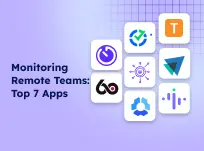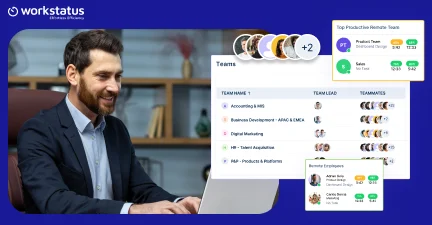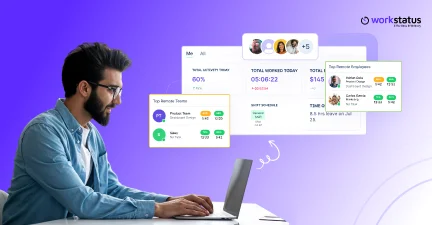Table of Contents
The days when employees could sit in an office 9-to-5 are long gone, especially in the big cities. Managing remote employees is not the only challenge for IT companies, the pandemic birthed another horror for them and that is the hot topic of the town, Employees Moonlighting.
Studies show that workers engage in freelance or independent work at least part-time for additional income. Facts say 75% of employees considered moonlighting and out of them 50% were actually involved in this practice.
It’s no wonder that employee moonlighting has become such a popular practice among today’s working professionals because employees can earn more money doing something they’re already familiar with as a side hustle instead of being tied down to their only full-time job.
Yet while this phenomenon can be good for employees, it can bring new challenges and threats to employers and companies.
It can lead to issues such as conflicts between obligations and productivity levels, moral dilemmas with employers or companies over non-compete agreements, and it can become a security problem if staff shares sensitive information with other companies without prior authorization or consent.
In this guide, we’ll explore some highly discussed moonlighting employment and freelancing questions, some insightful examples, and statistics and offer some of the best tips on tackling employees’ moonlighting and freelance activities to ensure that they don’t interfere with your business.
We will also cover how to deal with moonlighting employees to help you stay ahead of any potential problems in the future.
Let’s start with our very basic question.
Moonlighting Meaning & Its Various Forms

Moonlighting is having a second job or participating in income-generating activities apart from one’s main job. It is a frequent occurrence where people work on secondary jobs or freelance projects to supplement their income or do other things. Now that you know the moonlighting meaning, let’s know about the most common forms of moonlighting.
Here are some of the most common ones:
Part-time job: One of the most flexible forms of moonlighting is a part-time job. This could involve working in a retail store, restaurant, or any other establishment offering flexible hours, allowing you to balance your primary work schedule easily.
Freelancing: Moonlighting is usually related to freelancing or taking on independent projects in different fields like writing, graphic design, web development, consulting, or any other skill-based service. Freelancers can work on a project basis for various clients, thus earning extra income while keeping their main job.
Online work: The emergence of the gig economy and online platforms has created new moonlighting opportunities. People can do tasks such as data entry, virtual assistance, online tutoring, or selling products on e-commerce platforms from home.
Consulting or coaching: The specialists in particular areas may be able to provide consulting or coaching services to people or businesses outside their normal working hours. This could be about offering guidance, training, or mentorship in finance, marketing, or personal development.
Creative pursuits: Moonlighting can also be a gateway to personal growth and self-expression. It can involve pursuing artistic activities such as writing a book, producing music, creating art, or developing an app or a product. These endeavors not only have the potential to earn money but also to nurture your creativity and passion.
Entrepreneurial ventures: Some people moonlight by starting their own small business or side hustle, using their skills and passion to create a secondary income source. This may entail, among other things, running an online store, managing a dropshipping business, providing specialized services, or creating a product line.
Reasons Why Employees Engage In Moonlighting Activities
Here are some common reasons why employees engage in moonlighting activities:
1. Supplemental Income
Many employees have an extra job to supplement their main job to increase their income. Rising living costs, mounting debts, or unforeseen expenses may bring about financial pressures so people will seek extra sources of income from moonlighting.
2. Career Advancement
Employees may work extra hours to access career opportunities and skill training. If their job does not offer a future for growth or match their career goals, they may look for other jobs or projects to broaden their horizons.
3. Pursuit of Passion Projects
Moonlighting allows employees to pursue personal interests or passion projects that may not be possible in their regular occupation. Starting a side business, doing artistic work, or volunteering allows people to pursue their passions beyond the job.
4. Flexibility and Autonomy
Some workers consider flexibility in their work schedules and want to have a choice in their professional activities. Moonlighting in freelance or gig economy roles enables them to pick their projects, set their hours, and work on tasks that suit their lifestyle and interests.
5. Job Dissatisfaction
Dissatisfaction with their job role, responsibilities, or organizational culture may be why employees look for other ways to find job satisfaction by moonlighting. By trying different roles or industries, one may discover they are more satisfied and fulfilled at work than in their main job.
Moonlighting In The News Recently
Moonlighting has been a hot topic in the news recently, with some following stories showing how companies are taking some big steps to deal with moonlighters and freelancers.
- Story 1
Wipro fired 300 employees who moonlighted for its top competitors- According to Rishad Premji, anyone who works for Wipro while moonlighting for a competitor cannot be part of Wipro.
- Story 2
Infosys warns its employees against moonlighting and says it could result in termination- In the contract, all new Infosys staff must sign, they acknowledge that they will not engage in moonlighting or other outside employment as it will be a clear violation of company employees’ code of conduct.
New staff must also confirm that they have no outstanding commitments or obligations to any other employer who would interfere with their work at Infosys.
- Story 3
Tech Mahindra CEO N Ganapathy Subramaniam said that if the employees are meeting efficiency and productivity standards and are not committing fraud or doing anything that harms the company’s ethics or values, I have no problem with them making an extra buck through moonlighting.
- Story 4
Despite the ongoing debate about moonlighting in India, technology giant IBM has clarified that moonlighting is ethically wrong and the firm does not tolerate this practice from the employees.
Pros And Cons Of Moonlighting For Employees
Here are some moonlighting pros and cons for employees:
Pros of moonlighting for employees:
1. Additional income: The main advantage of moonlighting is the additional income earned besides the usual salary. This additional money can be used to boost one’s finances, pay off debts, save for future goals, or simply improve one’s standard of living.
2. Skill development: Moonlighting helps in the acquisition or the improvement of new skills. People can enhance their knowledge and skills by doing various jobs or projects, making them more effective in their jobs or future careers.
3. Networking opportunities: Through moonlighting, individuals can make new professional networks and connections, which can eventually lead to future job opportunities, collaborations, or business partnerships.
4. Exploration of interests: Moonlighting allows people to follow their dreams or hobbies after their main job. It allows for creative expression, entrepreneurial pursuits, or the search for alternative career paths.
5. Increased job satisfaction: For some people, moonlighting can be a source of satisfaction and diversity that their primary job lacks. It can be used as a tool to overcome boredom or dissatisfaction with their main job.
Cons of Moonlighting for Employees:
1. Time constraints: Moonlighting can be very time-consuming, leaving individuals with less time for personal or family commitments. Juggling several tasks at a time can cause burnout, stress, and a decline in productivity in both jobs.
2. Potential conflicts of interest: The moonlighting activities may conflict with the interests of the primary employer of an individual, especially if the second work is in the same industry or involves direct competition. Such a situation can cause legal or ethical problems.
3. Decreased focus and productivity: Combining several jobs will lead to distraction and diminished productivity in both. Fatigue and inadequate rest are also factors that can be responsible for performance decline.
4. Potential loss of primary job: Some employers may think that moonlighting is breaking company rules or a conflict of interest. Under these conditions, it might result in disciplinary actions or even termination from the primary job.
5. Health concerns: Working beyond the regular hours and having more responsibilities can cause physical and mental fatigue that affects the individual’s health and well-being.
6. Lack of work-life balance: it can upset the balance between work and private life, making time for leisure, social life, and self-care scarce.
Moonlighting Is On The Rise! Here Are The Stats To Prove It.
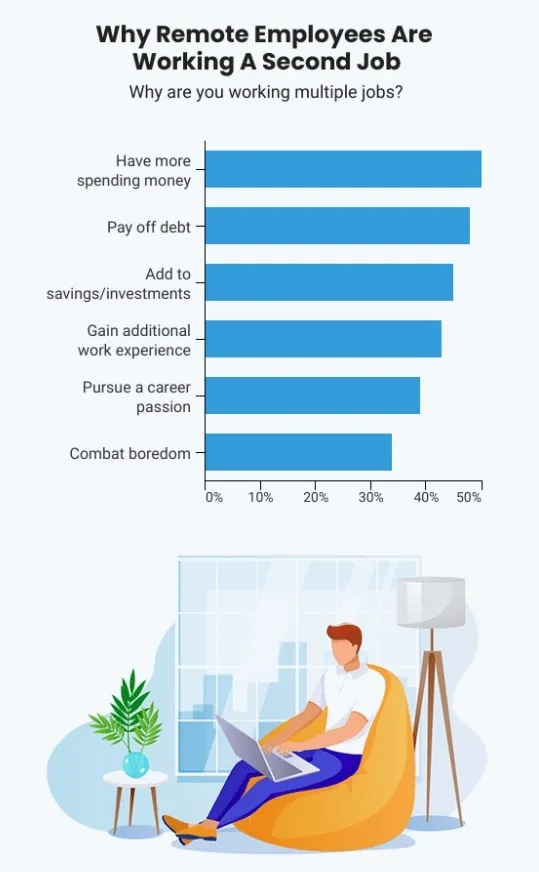
In recent years, there has been a rise in cases of employees moonlighting. Various studies have shown that people perform moonlighting during WFH and also in their spare time, which offers many benefits, such as an additional stream of income, supplemental retirement savings, and an opportunity to explore a new interest. And while many see this as an opportunity for personal growth, it is also becoming an issue within companies.
The growing concern among employers and managers is that moonlighting at work by employees will eventually give more attention to their side jobs than their full-time job.
1) A study by The University of Texas at Austin found that 60% of surveyed employees said they were more likely to moonlight if they felt dissatisfied at work or had less control over their working hours because moonlighting can offer them a higher degree of flexibility and independence which will make them happier as compared to their full-time job.
2) Consequently, after COVID-19 was declared a pandemic in 2020, an economic recession started, leading to thousands of layoffs. This led to employees looking for second jobs and working multiple jobs. During this time 70% of remote workers took a second job as moonlighting or freelancing to maintain a steady flow of income and employment.
3) As per the study conducted by ADP (Automatic Data Processing) research: by 2028, the population of US-based moonlighting as a freelancer will reach 90.1 million, representing 40% of the total workforce.
Top 5 Ways to Deal with Employees Moonlighting

1. Ask An Open-Ended Question
If you know that there is something that your employee is doing in their free time or want to know how to find out if an employee is moonlighting then it’s best to just approach them and ask them a general question such as
What’s new on your end?
Are you engaged with any other work except this job for better earnings?
Do you have anything else outside your normal hours here at our company?
How can we help you to balance things out more here?
By asking such questions and letting your employees speak freely about why they are finding moonlighting more comfortable, you are allowing them to express themselves, which will help you know what makes them unhappy to make changes. This will allow you to take the required steps to alleviate their concerns so that they no longer feel like their full-time job is insufficient to support them.
2. Share The Consequences Softly
If your employees know what they’re doing wrong or if you are aware that some of them are engaged in the moonlighting practice without informing you, it’s best to start by telling them how much you care about their well-being and how much you value their trust because that may be what has made them reluctant to tell you all along.
Then, gently remind them of the consequences of taking on moonlighting without your knowledge because this way, they’ll know that serious action can be taken against their behavior. This will allow you to communicate with them honestly and openly.
You can share that the other company will not be able to provide any benefits for moonlighting employees, including healthcare, vacation days, and other benefits.
This will let employees know that you are highly concerned about your working culture and that there is no room for any practices that can hamper company policies and efficiency.
3. Create A Non-Compete Agreement
Employers need to have non-compete agreements in place before hiring an employee. These agreements protect the company’s intellectual property and trade secrets, reduce competition, and prevent workers from working on projects or with any other competitor as freelancers.
In this agreement, you should include a prohibition against seeking employment elsewhere while employed by the company, assisting another business that is a competitor of the employer’s business, actions that will be taken for disclosing confidential information, and more.
An employer may also use it for employees engaged in moonlighting because non-compete agreements can limit an employee’s ability to do outside work, which can help the company minimize its risk and deal with unethical working policies.
4. Use Employee Activity Monitoring Software
There are several employee activity monitoring software that you can use to monitor your employees’ work hours. These programs have various features such as screenshot capturing, activity monitoring, productivity tracking, and much more, which make it easy for managers to check in on their team’s activity and ensure whether or not they are working for some other competitors.
These tools allow companies to identify any signs of moonlighting activities and deal with them before they become an issue. Employers will always be informed when someone is accessing another business email account, accessing sensitive company information outside of office hours, etc.
It makes it easy for companies to prevent issues and maintain productivity which helps keep things running smoothly.
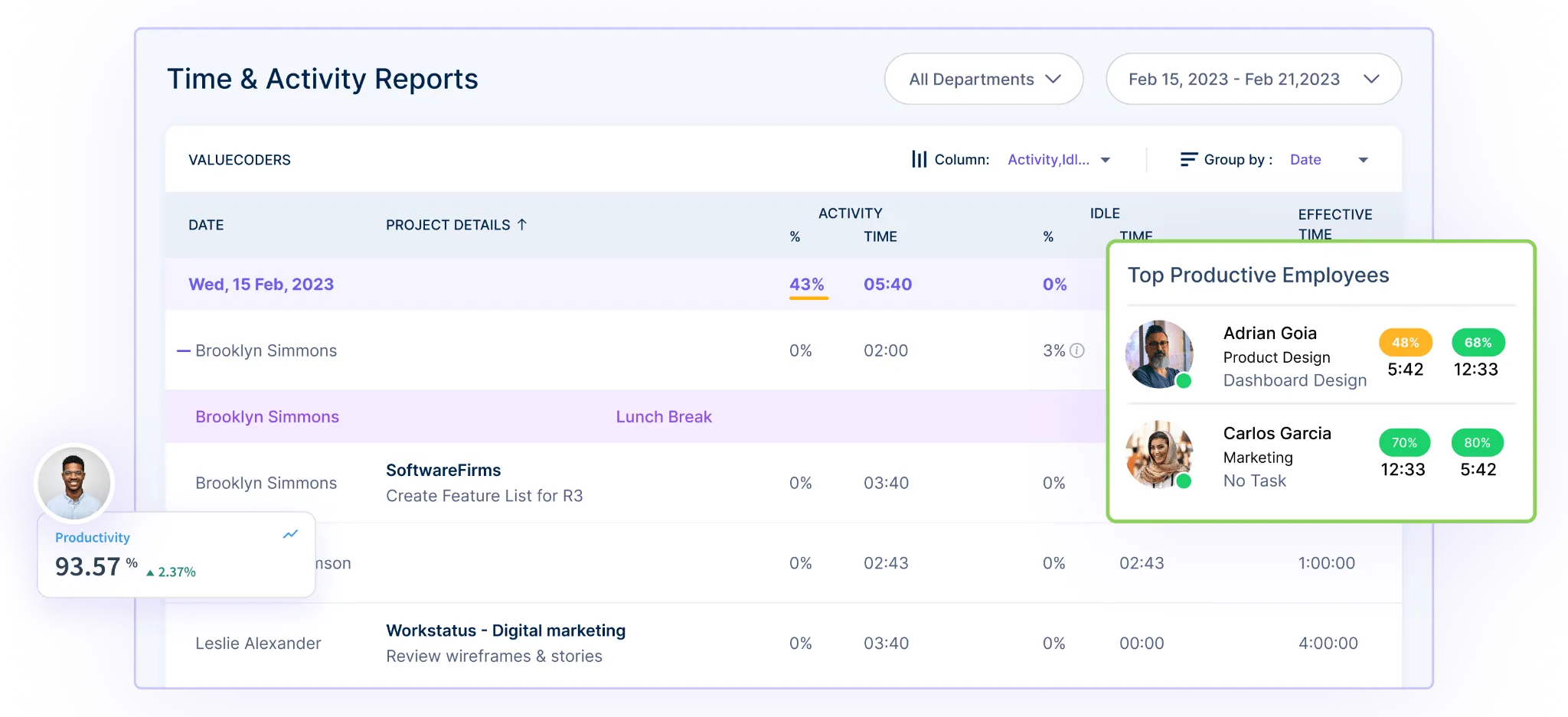
5. Make Sure All Employees Understand Company Moonlighting Policy
All employees need to be aware of company policies. This includes knowing what is allowed and what isn’t allowed. And, if they are unsure, they can always ask a manager.
To make sure all employees understand company moonlighting policy, it is recommended that the superiors brief them about the overview of company code of conduct during their orientation about various policies, such as how companies will treat employees who are performing as a moonlighter, what action will be taken against them when a person is violating the moonlighting policy and much more.
You can also share what might happen in case of violation of the rule. This will allow employees to understand the company’s expectations, so they don’t unknowingly violate a policy.
Is Moonlighting Legal In India?
Moonlight, or having a secondary job or freelance work along with a primary full-time job, is common in India. Nevertheless, moonlighting in India is legal only if certain conditions and regulations are met. undefined
1. Contract terms and company policies: The legality of moonlighting is mainly determined by the employment contract terms and the primary employer’s policies. Most employment contracts in India prohibit employees from engaging in other employment or business activities without the employer’s written consent. It is a breach of contract to violate such clauses and may result in disciplinary action or termination of employment.
2. Conflict of interest: Even if the employment contract does not prohibit moonlighting, employees should avoid situations where their secondary work conflicts with their primary job. This means working for a direct rival, using the main employer’s resources for secondary work, or engaging in activities that may jeopardize the interests of the main employer.
3. Intellectual property rights: Employees must be careful not to violate intellectual property rights or disclose confidential information about their main employer while moonlighting.
4. Sector-specific regulations: Certain sectors in India, such as government services, banking, and financial services, may have specific regulations or guidelines concerning moonlighting. Workers in these industries should carefully review and obey the appropriate rules and regulations.
5. Tax implications: Income received from moonlighting activities is taxable in India. Employees should be truthful when they report their extra income and follow tax laws to avoid penalties or legal action.
Moonlighting is not explicitly illegal in India, but employees must be careful and ask their primary employers about policies and expectations regarding moonlighting. Non-compliance with employment contract terms or activities that create a conflict of interest can eventually result in legal problems or the termination of employment.
It is advised that employees who plan to moonlight should tell their primary employers, get permission or consent, and ensure that their secondary job does not affect their primary job or violate any laws or regulations.
Final Thoughts
The question of how an employer should deal with employee moonlighting has been asked many times, and there isn’t a single answer. Should employees who moonlight be paid less? Should they be fired?
The best way to handle this situation will differ from person to person, company to company, and industry to industry. We have tried to provide a few ways for employers to address the issue of employee moonlighting to help you find what works best for your company.
That’s all for today.
We hope you enjoyed our blog post on Dealing with Employee Moonlighting.
If you have any comments or suggestions about dealing with the problem of employee moonlighting, please feel free to leave them below.
FAQs
Q1. Why do employees go for moonlighting?
There are many reasons why people have additional jobs outside of their day-to-day duties at the office. Some of the reasons are mentioned below.
1) They’re not content with what they’re currently doing, so they look for other ways to enhance their skills and experience
2)They want more income than their current job is providing, so they need another source of revenue
3) They want to explore their creative side through other challenging projects or hobby activities
4) Perhaps they don’t feel appreciated by their company and find solace in contributing elsewhere.
It may be a combination of all these factors, due to which employees resort to moonlighting.
Q2. Does moonlighting affect employee productivity?
Yes, although the percentage of decrease in productivity varies from person to person. In some cases, when a secondary job takes up most of the person’s time and energy, it could adversely affect his/her productivity in their primary workplace.
However, as long as this activity doesn’t affect the person’s performance during office hours, it might not amount for a serious issue.
Q3. What is moonlighting jobs and it is illegal?
In most cases, there is no law that restricts or prohibits employees from having multiple jobs. However, there could be instances where your employer disapproves of your moonlighting activities as they fear it may have a negative impact on your productivity at work or pose some conflict of interest issues within the organization.
Q4. Can employers take any legal action against employees who participate in moonlighting activities?
A . In general, employers can only take legal action if the following conditions are met –
- If employees have signed a contract that expressly forbids moonlighting.
- If they are in breach of duty,
- If there’s any fraudulent conduct involved,
- If they are breaching confidentiality agreements.
In the above situations, employers can take legal action against their employees, such as termination of employment.
However, if the employee has not signed a contract that prohibits moonlighting and they don’t violate any agreements or policies, then the employer has no power to terminate the employee.



